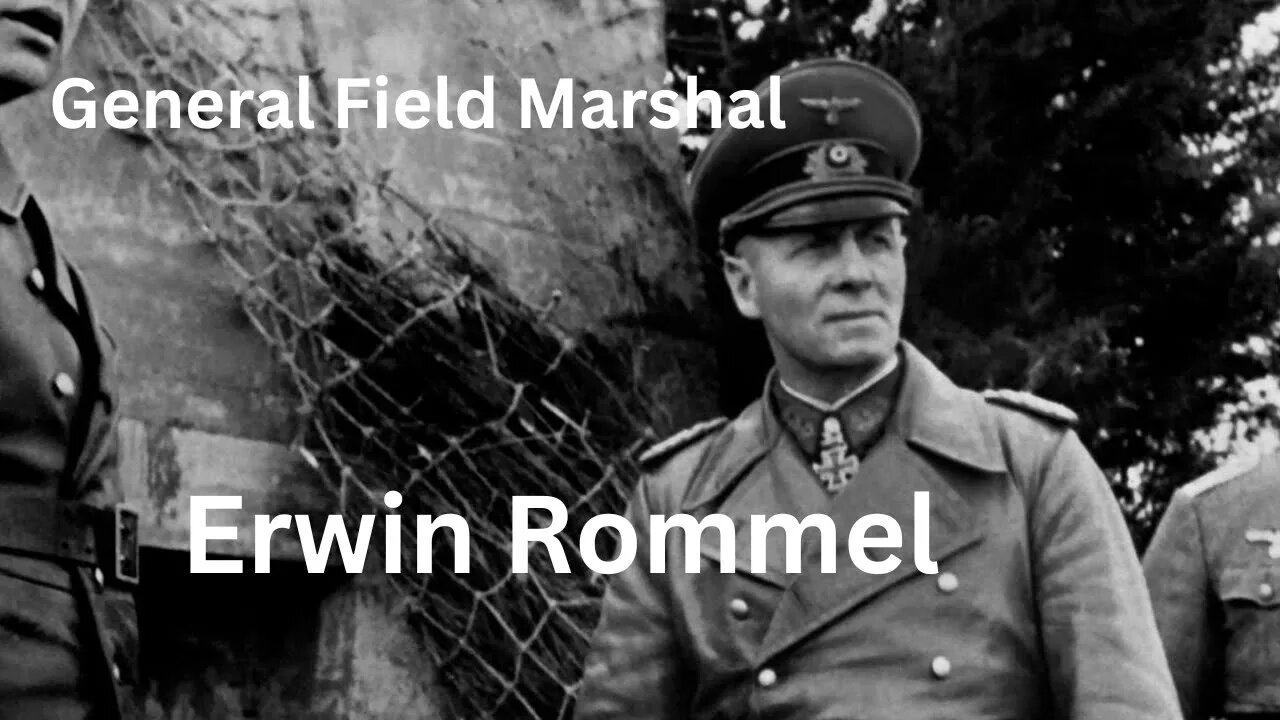Premium Only Content

Erwin Rommel: The Desert Fox and Master Tactician
Erwin Rommel: The Desert Fox and Master Tactician
Erwin Rommel, widely known as the "Desert Fox," was one of the most renowned military commanders of World War II. His strategic brilliance, innovative tactics, and charismatic leadership earned him respect and admiration from both allies and adversaries. Rommel's military career was defined by his successes in North Africa, where he showcased his exceptional command abilities and left an indelible mark on the annals of military history. In this video, we delve into the life and achievements of Erwin Rommel, a legendary figure whose impact on the art of war continues to resonate.
#ErwinRommel, #DesertFox, #MasterTactician, #MilitaryGenius, #WarfareStrategist, #TacticalBrilliance, #WorldWarII, #GermanCommander, #AfrikaKorps, #NorthAfricaCampaign, #InnovativeLeader, #MilitaryMind, #ManeuverWarfare, #RapidArmoredThrusts, #SurpriseAttacks, #IntegrateAirPower, #Mobility, #BattlefieldGenius, #MilitaryLegacy, #LegendaryCommander, #WarHero, #LeadershipExcellence, #DecentralizedCommand, #InspiringLeaders, #InfluentialMilitaryThinker, #UnconventionalTactics, #MilitaryAchievements, #StrategicThinking, #WarfareInnovation, #InimitableCommander, #MilitaryHistoricalFigure
History is a broad term that refers to the study and interpretation of past events and their significance to the present day. It encompasses the actions, beliefs, and experiences of human beings throughout time, as well as the physical artifacts and records that document these events. The study of history helps us to understand how the world we live in today has been shaped by past events and how we can learn from them.
The importance of history cannot be overstated. By examining past events, we can learn from the successes and failures of those who came before us, and apply this knowledge to our own lives and society. It helps us to understand the roots of current political, economic, social, and cultural issues and how they have evolved over time. History can also help us to appreciate the diversity of human experience and the many ways in which people have interacted with one another throughout history.
One of the key methods used in the study of history is the interpretation of primary sources. These can include written records, such as letters, diaries, and official documents, as well as physical artifacts like artwork, tools, and architecture. By examining these sources and analyzing them in context, historians can gain insights into the beliefs, values, and motivations of past peoples and societies. This can help us to understand the complexities of human behavior and decision-making, as well as the impact of larger social, economic, and political forces.
Another important aspect of the study of history is the consideration of multiple perspectives. This involves taking into account the viewpoints of different groups of people, such as women, minorities, and those who have been historically marginalized or excluded from mainstream narratives. By doing so, historians can gain a more complete picture of past events and the ways in which they have affected different communities.
In addition to its academic importance, history also plays a crucial role in shaping our collective memory and identity as a society. By remembering and commemorating important events and figures from the past, we can create a shared sense of history and belonging. This can help us to build stronger communities and foster greater empathy and understanding between different groups of people.
Overall, the study of history is essential for understanding ourselves, our world, and our place in it. Through careful analysis of past events and sources, we can gain insights into the complexities of human behavior and decision-making, appreciate the diversity of human experience, and learn from the successes and failures of those who came before us.
-
 32:11
32:11
A Small Part of History
1 month ago9/11 Attacks Explained: Real Stories, Conspiracies, & the Legacy of September 11
21 -
 5:16:57
5:16:57
iCheapshot
6 hours agoCheap Plays Warzone Again? What!?
27.4K1 -
 2:30:14
2:30:14
PandaSub2000
8 hours agoCHAOS & FURY | Episode 27: Attack Of The Cranks (Edited Replay)
33.4K1 -
 3:09:39
3:09:39
Spartan
5 hours agoSpartan - Pro Halo Player for OMiT | Ranked for a little bit
21K1 -
 15:15
15:15
Adam Does Movies
1 day ago $3.00 earnedHappy Gilmore 2 - Movie Review
31.4K18 -
 3:10:16
3:10:16
Toolman Tim
8 hours agoDOOM: The Dark Ages ALMOST DONE! | The Gaming Thinktank
14.1K -
 5:52:32
5:52:32
SkrimpNGritZ
6 hours agoSkrimpNGritz Off the Grid Live
13.2K -
 16:29
16:29
Mrgunsngear
1 day ago $0.72 earnedGirsan Witness 2311 Match X - Staccato XC On A Budget But Does It Work?
20K6 -
 14:54
14:54
Tundra Tactical
7 hours agoTundy's SIG MEME Review 2: The Reload!!!
16.3K4 -
 3:07:52
3:07:52
Baked Linguini's Home Channel
6 hours agoSpace Marines Co-Op Action
3.8K1